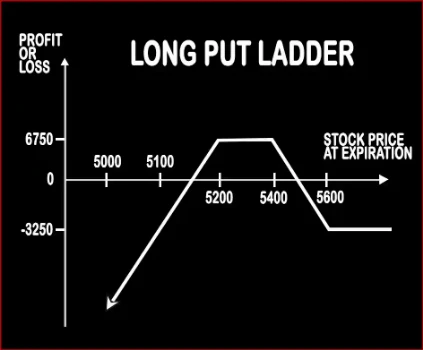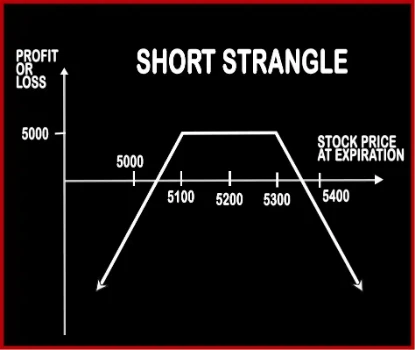Compare Strategies
| LONG PUT LADDER | SHORT STRANGLE | |
|---|---|---|

|

|
|
| About Strategy |
Long Put Ladder Option StrategyLong Put Ladder can be implemented when a trader is slightly bearish on the market and volatility. It involves buying of an ITM Put Option and sale of 1 ATM & 1 OTM Put Options. However, the risk associated with this strategy is unlimited and reward is limited. Risk:< |
Short Strangle Option StrategyThis strategy is similar to Short Straddle; the only difference is of the strike prices at which the positions are built. Short Strangle involves selling of one OTM Call Option and selling of one OTM Put Option, of the same expiry date and same underlying asset. Here the probability of making profits is more as there is a spread between the two strike prices, and if .. |
LONG PUT LADDER Vs SHORT STRANGLE - Details
| LONG PUT LADDER | SHORT STRANGLE | |
|---|---|---|
| Market View | Neutral | Neutral |
| Type (CE/PE) | PE (Put Option) | CE (Call Option) + PE (Put Option) |
| Number Of Positions | 3 | 2 |
| Strategy Level | Advance | Advance |
| Reward Profile | Limited | Limited |
| Risk Profile | Unlimited | Unlimited |
| Breakeven Point | Upper Breakeven Point = Strike Price of Long Put - Net Premium Paid, Lower Breakeven Point = Total Strike Prices of Short Puts - Strike Price of Long Put + Net Premium Paid | Lower Break-even = Strike Price of Put - Net Premium, Upper Break-even = Strike Price of Call+ Net Premium |
LONG PUT LADDER Vs SHORT STRANGLE - When & How to use ?
| LONG PUT LADDER | SHORT STRANGLE | |
|---|---|---|
| Market View | Neutral | Neutral |
| When to use? | This Strategy can be implemented when a trader is slightly bearish on the market and volatility. | This strategy is perfect in a neutral market scenario when the underlying is expected to be less volatile. |
| Action | Buy 1 ITM Put, Sell 1 ATM Put, Sell 1 OTM Put | Sell OTM Call, Sell OTM Put |
| Breakeven Point | Upper Breakeven Point = Strike Price of Long Put - Net Premium Paid, Lower Breakeven Point = Total Strike Prices of Short Puts - Strike Price of Long Put + Net Premium Paid | Lower Break-even = Strike Price of Put - Net Premium, Upper Break-even = Strike Price of Call+ Net Premium |
LONG PUT LADDER Vs SHORT STRANGLE - Risk & Reward
| LONG PUT LADDER | SHORT STRANGLE | |
|---|---|---|
| Maximum Profit Scenario | Strike Price of Long Put - Strike Price of Higher Strike Short Put - Net Premium Paid - Commissions Paid | Maximum Profit = Net Premium Received |
| Maximum Loss Scenario | When Price of Underlying < Total Strike Prices of Short Puts - Strike Price of Long Put + Net Premium Paid | Loss = Price of Underlying - Strike Price of Short Call - Net Premium Received |
| Risk | Unlimited | Unlimited |
| Reward | Limited | Limited |
LONG PUT LADDER Vs SHORT STRANGLE - Strategy Pros & Cons
| LONG PUT LADDER | SHORT STRANGLE | |
|---|---|---|
| Similar Strategies | Short Strangle (Sell Strangle), Short Straddle (Sell Straddle) | Short Straddle, Long Strangle |
| Disadvantage | • Unlimited risk. • Margin required. | • Unlimited loss is associated with this strategy, not recommended for beginners. • Limited reward amount. |
| Advantages | • Reduces capital outlay of bear put spread. • Wider maximum profit zone. • When there is decrease in implied volatility, this strategy can give profit. | • Higher chance of profitability due to selling of OTM options. • Advantage from double time decay and a contraction in volatility. • Traders can book profit when underlying asset stays within a tight trading range. |